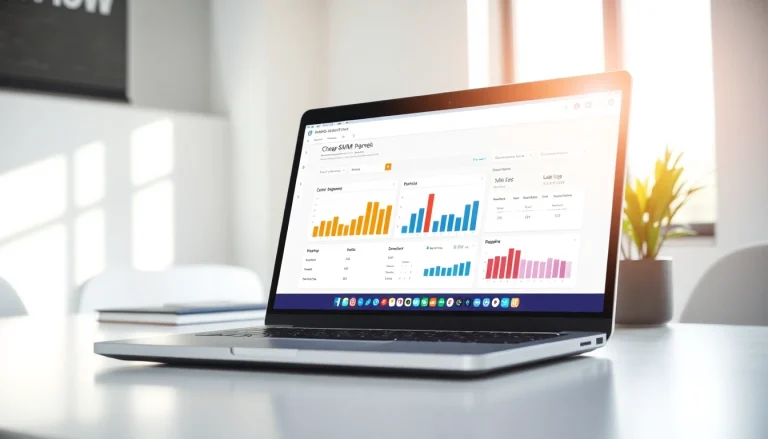
Understanding Mortgage Calculators
For anyone looking to buy a home in British Columbia, understanding your mortgage options is crucial. A BC Mortgage Calculator is not just a tool for obtaining numbers; it is a gateway to informed financial decisions. This article will take you through everything you need to know about mortgage calculators, how to use them effectively, and the factors that influence your mortgage payments in BC.
What is a BC Mortgage Calculator?
A BC mortgage calculator is an online tool that helps potential homebuyers estimate their monthly mortgage payments based on various input factors, such as loan amount, interest rate, and amortization period. This tool is particularly useful for first-time homebuyers who may be unfamiliar with the specifics of mortgage financing in British Columbia. By inputting relevant data, users can get an approximation of what their monthly financial commitments will look like, enabling them to make more informed purchasing decisions.
Key Features of a Mortgage Calculator
- Loan Amount Input: Users can specify how much they plan to borrow, which is fundamental in determining monthly payments.
- Interest Rate Calculation: The calculator allows users to input their expected interest rates, which can vary significantly based on market conditions and the lender’s offerings.
- Amortization Period: Users can choose the duration over which they plan to repay the loan. Common periods are 15, 20, or 30 years.
- Prepayment Options: Many calculators provide options to explore the impact of making extra payments on principal, helping users see how quickly they could pay off their mortgage.
- Visualization Tools: Some calculators offer graphical representations of payment schedules, helping users visualize how their payments will fluctuate over time.
Benefits of Using a Calculator
The primary benefit of using a mortgage calculator is the ability to crunch numbers quickly and easily, resulting in actionable insights that can guide your home purchase decisions. Among the many advantages, the most notable include:
- Budgeting Assistance: By estimating what your monthly payments will be, you can budget more accurately for your home expenses, including property taxes and home insurance.
- Empowerment in Negotiations: Understanding your financial limits allows you to negotiate better with lenders and real estate agents.
- Quick comparisons: You can compare different mortgage options by varying interest rates and terms to find the best deal.
- Clarity on Affordability: Calculators offer insights into how much home you can realistically afford based on your income and debts.
How to Use the BC Mortgage Calculator Effectively
Step-by-Step Guide to Inputting Data
Using a BC mortgage calculator is straightforward, but entering accurate data is essential for obtaining useful results. Here’s a step-by-step guide:
- Determine Your Loan Amount: Assess how much you plan to borrow for your home. This figure generally includes your down payment and any additional borrowing needs.
- Research Interest Rates: Look up current mortgage interest rates from various lenders in BC. The difference of even a fraction of a percentage point can significantly impact your monthly payment.
- Select Your Amortization Period: Choose the length of time over which you plan to pay off the mortgage. Shorter terms will have higher monthly payments but lower overall interest costs.
- Input Other Costs: If applicable, enter costs such as property taxes, insurance, and any homeowner association fees into the calculator to get a fuller picture of your monthly expenses.
- Review the Results: After inputting your data, take time to review the monthly payments displayed by the calculator. Consider adjusting any input variables to see how they affect your payments.
Common Mistakes to Avoid
While mortgage calculators are user-friendly, here are common pitfalls to be aware of:
- Incorrect Loan Amount: Many users underestimate how much they’ll need to borrow, leading to unrealistic payment expectations.
- Ignoring Other Expenses: Failing to account for property taxes, insurance, and upkeep can lead to overextending finances.
- Choosing the Wrong Amortization Period: Opting for longer amortization for lower payments might seem appealing; however, this can lead to paying significantly more in interest over time.
Interpreting Your Results
Understanding the results from your BC mortgage calculator input is vital for effective planning. Here are some key interpretations to consider:
- Monthly Payment Breakdown: Look at how much of your monthly payment goes towards principal versus interest. This breakdown is helpful for understanding how quickly you’re building equity.
- Total Interest Paid: Analyze the total interest you will pay over the life of the loan. A smaller, lower interest cost enhances financial wellbeing over the long term.
- Impact of Prepayments: If you choose to enter potential prepayment amounts, see how this influences your total owed and monthly payments. Making additional payments can dramatically reduce interest costs.
Factors Affecting Mortgage Payments in BC
Interest Rates and Terms
Interest rates can vary significantly based on market conditions and the borrower’s financial profile. In British Columbia, interest rates are influenced by the Bank of Canada’s policy rates, leading to fluctuations depending on the broader economic environment. Here are critical points to consider:
- Fixed vs. Variable Rates: A fixed-rate mortgage locks your interest rate for the entire term, providing stability. A variable rate may start lower but can fluctuate with market conditions, potentially increasing costs over time.
- Market Conditions: Being informed about macroeconomic factors can aid in choosing suitable times to lock in rates or adjust your mortgage strategy.
Down Payment and Loan Amount
The size of your down payment plays a pivotal role in your mortgage costs. In British Columbia, the typical requirement is a minimum of 5% of the home’s value, though putting down 20% or more can eliminate default insurance costs:
- Less than 20% Down Payment: If your down payment is less than 20%, lenders will require mortgage default insurance. This insurance adds to your overall borrowing costs.
- Impact on Loan Amount: Higher down payments mean lower loan amounts, which translates to lower monthly payments and less interest paid over time.
Property Taxes and Insurance
In addition to mortgage payments, buyers in BC should budget for property taxes and homeowner’s insurance, as these costs can substantially affect overall affordability:
- Property Taxes: Vary by municipality and are usually based on the assessed value of the property. Ensure to check the local tax rate when shopping for homes.
- Insurance Costs: Homeowner’s insurance is mandatory, and costs can vary based on the location, type of home, and coverage options selected.
Comparing Different Mortgage Options
Fixed vs. Variable Rate Mortgages
When considering mortgage options, prospective buyers must choose between fixed and variable rate mortgages:
- Fixed Rates: Stability is a significant advantage, as monthly payments won’t change regardless of market fluctuations. This makes budgeting easier, especially in rising interest rate environments.
- Variable Rates: While these rates are initially lower, they can change over time, potentially leading to higher payments. Borrowers should weigh their risk tolerance when choosing this type of mortgage.
Using the Calculator for Comparison
Utilizing the BC mortgage calculator can streamline the comparison process. By inputting different interest rates and terms, home seekers can see an immediate impact on their monthly payments, enabling them to make informed decisions about which mortgage option aligns with their financial goals.
Tips for Choosing the Right Mortgage
Choosing the right mortgage does not have to be complex. Here are some tips to simplify your decision-making process:
- Assess Your Financial Health: Understand your credit score and debt-to-income ratio to determine how much you can afford to borrow.
- Compare Lenders: Not all lenders offer the same rates and terms. Research various options, get quotes, and compare not only rates but also associated fees.
- Consider Pre-Approval: Getting a pre-approval can give you a better sense of your budget while strengthening your position during negotiations.
Real-Life Scenarios and Examples
Case Study: First-Time Home Buyers
Consider a scenario involving first-time home buyers Sarah and John, who are looking to purchase their first home in Vancouver. They plan to buy a home priced at $700,000 and make a down payment of 10%:
- Enter Data: They input their desired loan of $630,000 (after the down payment) into the calculator.
- Input Current Rate: They estimate an interest rate of 3.5% and select a 30-year amortization period.
- Analysis Results: The calculator reveals that their monthly payment will be approximately $2,830, not including property taxes and other costs.
This scenario illustrates how effectively using a mortgage calculator can help potential homeowners gauge affordability before even beginning their search.
Real-World Implications of Calculator Results
The results provided by the BC mortgage calculator impact various decisions, such as budgeting for other home-related expenses and determining whether to compromise on location or home size to fit their financial abilities.
How to Adjust Calculations for Special Situations
Factors like fluctuating interest rates, changes in down payment percentages, or unexpected fees can shift how mortgage payments are calculated. Knowledge about these variables aids homeowners in staying prepared. For example, if Sarah and John receive a monetary gift for their down payment, this would lower their borrowing costs and significantly alter their monthly payments. This adaptability is crucial for smart financial management.






